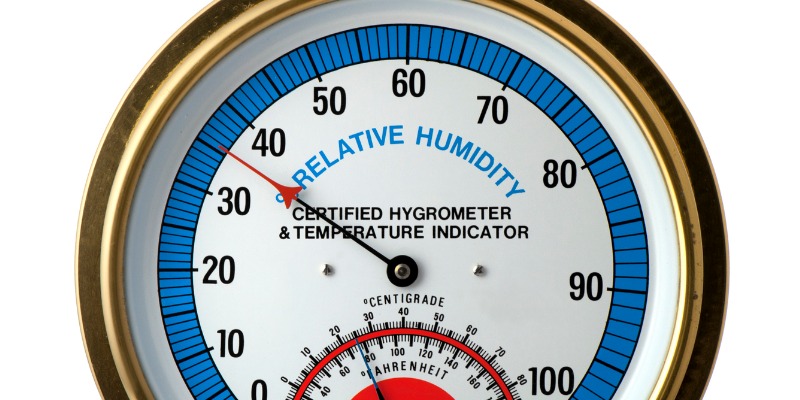
How does humidity affect the temperature in a house? The humidity level changes the temperature in your home and also changes how you experience that temperature. Air with just the right amount of humidity holds more heat than dry air and makes you feel more comfortable in the winter. In the summer, air with low levels of humidity helps you cool off faster. Here’s what you need to know.
What’s the Right Humidity?
The right indoor humidity levels are based on the outside temperature and season. Health Canada says that you should aim for less than 55{6369897c66410f53ef897a90d73c2d12c99a8251621b6aa0889d3e95dfbde6d2} humidity in the summer. The drier the air, the more effective your sweat is at cooling you off, as it evaporates faster. As a result, you feel cooler in higher temperatures and don’t have to work your air conditioner as hard to feel comfortable. This helps your air conditioner last longer.
The opposite is true in the winter. As cool air rolls in, humidity leaves. Especially in Canada, we have a serious lack of humidity throughout the winter. This actually makes it harder for our air to retain heat. Health Canada suggests that you boost your home humidity to more than 30{6369897c66410f53ef897a90d73c2d12c99a8251621b6aa0889d3e95dfbde6d2} in the winter. This will help you feel more comfortable by making the air feel warmer, even when your furnace is set to the same temperature. It also helps keep your furnace or other heating system from working unnecessarily hard. Ideally, your humidity levels should be between 30{6369897c66410f53ef897a90d73c2d12c99a8251621b6aa0889d3e95dfbde6d2} to 55{6369897c66410f53ef897a90d73c2d12c99a8251621b6aa0889d3e95dfbde6d2} at all times.
Other Effects of Humidity
Besides changing your room temperature, humidity has other effects on your home:
- Air quality: When humidity is too low, air quality suffers. Without moisture in the air, dust particles move more freely. Plus, your skin adds to the dust by drying out and shedding more dead skin cells. On the other hand, when humidity is too high, mould growth may develop and mould spores lower air quality and may irritate you.
- Home wear and tear: Very high or low humidity may also cause unnecessary wear-and-tear in your home. When things are dry, home features like caulking and tile grout may dry out faster and chip away. When things are too moist, your drywall and wood may become too wet, which may cause them to wear down or grow mould. Metal may also rust in high humidity and fabrics may grow mould or bacteria and pick up a stuffy smell.
It’s important to keep your humidity at the right levels to prevent poor air quality and wear and tear on your home.
Get Your Humidity Under Control
We install and maintain humidifiers and that can help your home feel more comfortable throughout the year. For all of your HVAC needs contact Woodbridge GTA ClimateCare.



